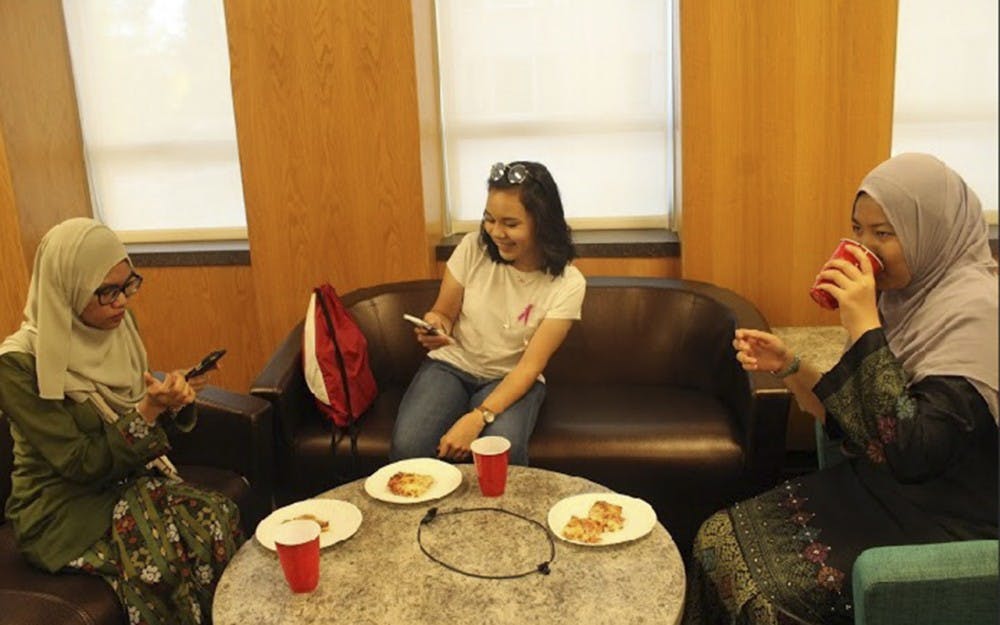Women of all religions will have a chance this Saturday to show solidarity with friends and neighbors who choose to wear a head covering.
Those who do not wear a hijab in their daily lives are being encouraged through a Facebook event, “A Day in Her Hijab,” to put one on to understand the experiences of their Muslim peers who choose to practice this show of modesty.
The idea has made its rounds to IU and its Muslim community through social media.
“I think wearing a hijab is a much bigger statement than wearing a safety pin,” said Jenan Matari , the Facebook event’s creator, in a Facebook message. “It really throws you into glimpse of the daily experiences of a Muslim woman. What better way to experience life as a Muslim woman than to go out in public in hijab and record your experiences/how it made you feel?”
The hijab is a headscarf worn by Muslim women to display modesty in accordance with their interpretation of Islam. It is usually accompanied by modest clothing as well. Americans sometimes associate the article of clothing with oppression, but most Muslims usually do not consider this to be the case for themselves.
IU senior Fariha Hossain, who chooses to wear a hijab, said she wants to share the event on Facebook to encourage more people to participate.
it is not offensive for non-Muslims to wear a head covering on Saturday to try to experience what others deal with every day, she said.
She has friends who often want to try on a hijab if they find it in her room. Sometimes they are afraid it might be inappropriate for them, but Hossain encourages them to try it.
“It’s literally just a piece of cloth,” Hossain said. “It’s a really supportive and open-minded idea.”
Matari created and shared the Facebook event to help others better understand the community.
The safety pin was worn by many people after the election as a way to show support and acceptance of groups that are afraid of statements President-elect Donald Trump has made against them.
Matari said she believes wearing a hijab is a better way for people to show solidarity with minorities and learn to be a better ally.
Hossain wears a hijab every day and has since she was a junior in high school. For her, it is a sign of both modesty and her trust in God.
Hossain said she originally began to consider wearing the hijab at her Muslim Youth of North America camp where she was very involved as a teen.
“There are some people in my life that assumed my parents forced me to do it, but they’ve never mentioned it,” Hossain said.
Since the election, Hossain said the reaction from her friends has been mostly positive, and many show concern for her well-being.
“People who aren’t Muslim reach out to me,” Hossain said. “They want to be there as much as they can.”
Sophomore Iman Mahoui, who said she has worn a hijab for five years, has found her headscarf helps her connect with others post-election.
The day after Trump was elected, Mahoui went to Starbucks and talked to a barista who often works when she goes.
She said he was able to relate to her because he is gay, and he gave her a free drink as a sign of compassion.
Mahoui said she liked that her hijab helped her stand out in a positive way.
“Both of us have felt, as minorities in America, this political hurt in our society,” Mahoui said.
Mahoui said she is proud of her religion and the way she dresses. Some people believe it is a sign of oppression, but more often than not, it is the choice of each individual woman.
“Just talk to a hijabi,” Mahoui said. “Do they sound oppressed? Most of the time, it empowers us.”
She thinks wearing a hijab for a day will help more people understand the self-consciousness that can sometimes accompany it, she said.
It may also encourage those who participate to start conversations with their friends who might not know about the event.
“It’s an amazing form of sharing information, sharing knowledge, sharing compassion,” Mahoui said.




